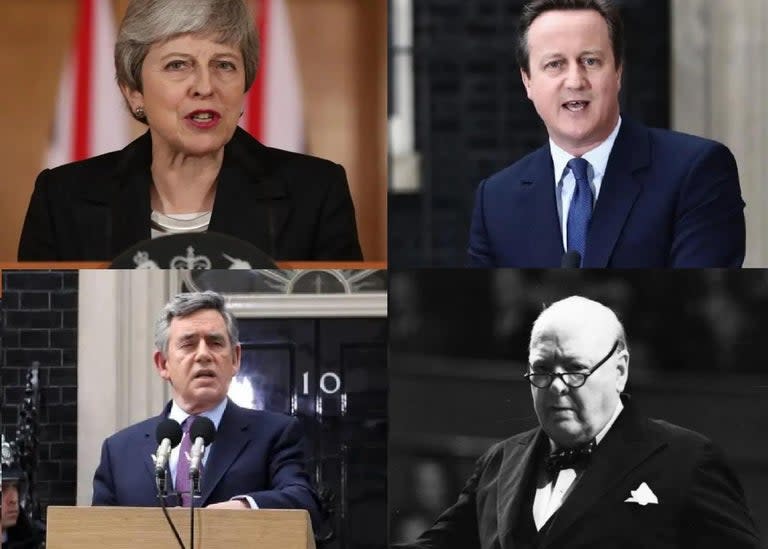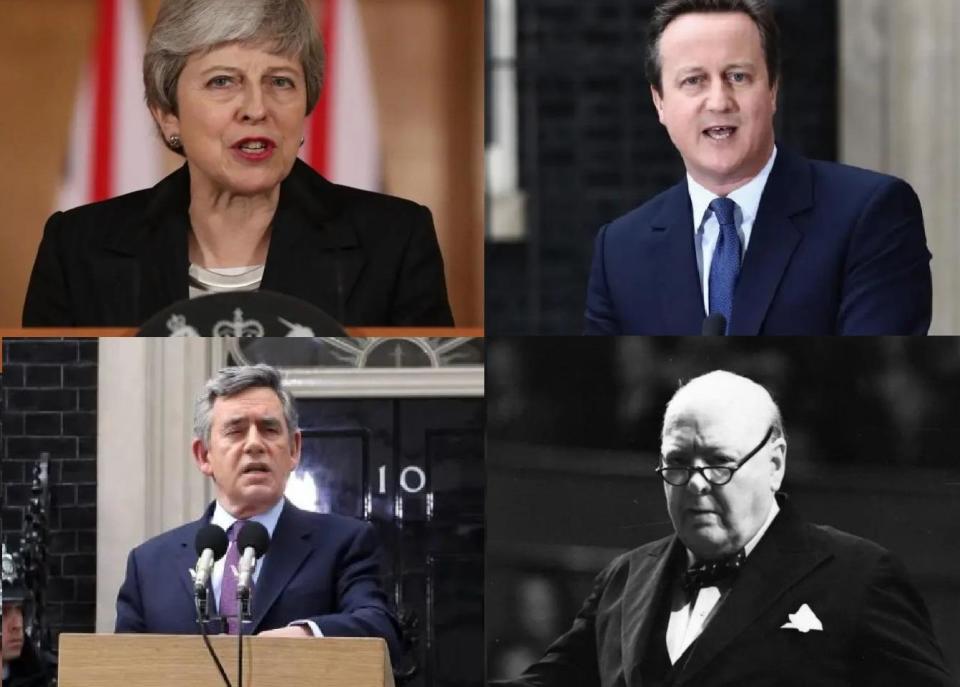Where Theresa May sits in the ranking of post-war British prime ministers
As Boris Johnson takes the keys to Number 10, the conversation will soon turn to Theresa May's place in history. When ranked against former leaders, where does she stand in the pantheon of post-war prime ministers?
It’s hard to make the case for putting her near the top. After all, as the popular phrase goes, “she had one job” and she bungled it. Brexit defined her relatively short premiership and ultimately wrecked it. There are scant compensating positives – she found it difficult to list them in her tearful resignation statement.
Still, if turns out that her successor also fails to deliver Brexit, or does so at the cost of wrecking the economy and the Tory party, history may yet prove more generous to her and her deal than today’s headline writers. She may have been right all along: we shall see.
Here is one possible league table, therefore, with May featuring towards the bottom, just inside the relegation zone.
1. Margaret Thatcher (1979 - 1990)
Even by the time she died in 2013, she was still capable of dividing the nation. Although now some of her legacy is under attack, she left her mark on the nation – acceptance of a basically free enterprise market economy, taming the unions, privatisation, and inward investment and liberalising markets. Brave, and the archetypal “conviction politician”, it probably couldn’t have all been done without her sheer force of personality and powerful intellect. Victory in the Falklands, defying the IRA and forging a strong special relationship with Reagan complete the picture of a consummate politician, undone at the end of her premiership by a loss of judgment – the poll tax, an arrogant style and a visceral hostility to Europe that alarmed her cabinet colleagues.
2. Clement Attlee (1945 - 1951)
The conventional wisdom is that the Attlee government was an extraordinarily talented one which achieved epochal social change and changed the efface of British society. His achievement included the NHS, social security, full employment, freedom for India, the Atlantic alliance, nationalisation of the commanding heights of the economy, and institutionalised a Keynesian revolution in steering he economy. All true, and “Clem”, famous for is clipped speech and keenness to delegate presided over it all with brisk efficiency, in between checking the cricket scores.
3. Harold Wilson (1964 - 1970, 1974 - 1976)
Regarded as a political colossus in his time in office, Wilson’s historical reputation soon dropped off a cliff, seen as a scheming, two-faced figure, content to offer the country an easy life, as Britain slid into inexorable decline, with only the Open University to show for his decades at the top. Though history has been kinder in recent years, as a new generation comes to appreciate the social reforms encouraged by his government (divorce, race relations, abortion, abolition of hanging), and just how tricky it is to keep the Labour Party united, not least on Europe.
4. Tony Blair (1997 - 2007)
Like Wilson, Blair was an election winning genius with a formidable common touch, mastery of the Commons and the machinery of government, with an almost supernatural feel for the political mood. His reputation now stands a nadir – but he deserves better. Iraq is clearly his defining failure, but the vast range of social and economic reforms undertaken under his administration should be placed in the balance – devolution for Scotland and Wales, the Good Friday Agreement, independence for the Bank of England, reforms in education and funding for the NHS, LGBT+ rights and the minimum wage, plus a brief period of leadership in Europe in partnership with America.
5. David Cameron (2010 - 2016)
Again, Cameron's premiership has been defined by one catastrophic decision – to offer and then deliver an “In/Out” EU referendum. All too easily overlooked is that this was a golden age of good, strong and stable leadership – the Cameron-Clegg, Con-Lib Dem government offered the country in the first half of this decade, managing the necessarily painful process of recovering from the financial crisis and putting the public finances and the economy on a sustainable footing. The ex-Bullingdon boy did much to modernise his party, and to govern the country pragmatically. In reality, given the rise of Ukip and Tory Europhobia, he probably had little alternative but to offer that EU referendum – he would have been swiftly deposed by someone who would – someone more Eurosceptic, like, say, Theresa May…
6. Gordon Brown (2007 - 2010)
This broody, glum, grumpy figure has as his excuse for a mixed record on office that he came to the premiership too late – having been denied it by Blair for years he arrived too late to be able to do much. Besides, he was soon overwhelmed by the 2008 banking crisis. Brown was certainly unlucky – as the “bigoted woman” episode showed, but there was no doubt he as surprisingly poor public performer, given his past record in the Commons and at party conferences. He did, though, with Bank of England governor Mervyn King, come up with a scheme to save the broken banks which saved the world. For that we should be very grateful.
7. Sir Winston Churchill (1951 - 1955)
Normally, Churchill rightly tops of the premiership league table because of the war. But here we can only review his postwar government, which was a pretty quiet affair. The best that can be said for it is that there were no major disasters – but Churchill and his ministers did fail to realise the serious intent of those across the channel working on their project of a European Economic Community and the eventual creation of a United States of Europe. Over 80 when he finally caved in to pleas for him to retire, he had by then suffered coupe of secret strokes, and was enjoying an overlong Indian summer. Perhaps had Churchill shown the leadership the nation needed to shape this coming European alliance his record, and that of his successors, might have been markedly different.
8. Sir Alex Douglas-Home (1963 - 1964)
In office for not quite a year, it is difficult to say much about the former 14th Earl of Home’s time as prime minister. A patrician figure who once described the old age pension as a “donation”, slightly to the right of his party, he inherited a bit of a political mess from Macmillan, and had to deal with the then White Hot wizardry of Labour’s young leader Harold Wilson. Miraculously he almost won the 1964 general election, despite once saying that he used matchsticks to understand economics.
9. James Callaghan (1976 - 1979)
Another short-lived premiership, like Home, Brown and Major, Callaghan had the misfortune to have to take over from a much bigger personality, in this case Wilson, and to try to thrive under the shadow of their predecessor. Callaghan’s calm, avuncular air and sheer determination to make his minority government survive saw him though for as long as he did. He kept the government and party together through severe economic and financial crises, and managed to retain Tony Benn and Denis Healey in the same cabinet. His government saw unemployment and inflation coming down, but the final failure of a pay policy and the Winter of Discontent sealed his fate. Labour was out for 18 years. It was not his fault he happened to be in post when social democracy died.
10. John Major (1990 - 1997)
Still underestimated, it is difficult to believe that Major was once a rather exciting figure, another symbol of a meritocratic, modern Tory party of opportunity for all. The son of a skint former circus performer who grew up in some hardship in Brixton, and who once failed his job interview to become a bus conductor, Major was the archetypal working class Tory made good hero. Against the odds, he beat Labour in the 1992 election by a decisive margin, and managed to get his Maastricht Bill on Europe through parliament, despite being the target of a determined guerrilla war by the Tory Eurosceptics of the day. Hobbled by a divided, ambitious cabinet, fractious party, disloyal MPs, Margaret Thatcher playing back street driver and the New Labour phenomenon, Major did well to deliver as much as he did – a strongly expanding economy, the foundations of peace in Ireland and keeping the UK inside Europe but outside the euro. Then, as now, the Tory party doesn’t appreciate compromise when it comes to Europe.
11. Harold Macmillan (1957 - 1963)
Like May, Macmillan’s premiership was also wrecked by Europe – but in the reverse direction in that Macmillan failed to get Britain in rather than out.
Having nursed his party and the country back from the 1956 Suez fiasco and repaired relations with the Americans, meaning the UK secured its nuclear weapons, he won the 1959 election with a huge majority. Two years after a painful slog of negotiations about the Common Agricultural Policy and trade concessions for the British Commonwealth, the French president De Gaulle vetoed the UK’s application in 1963. Macmillan’s government had lost its economic purpose, and the old Edwardian showman was suddenly looking out of date. A bout of ill-health gave him his reason to quit, with the Profumo affair a lasting embarrassment. Witty, with a fine sense both of history and of the future of Britain, and a dominant force in politics for a decade, he is surprisingly little remembered today.
12. Theresa May (2016 - 2019)
May’s many failings are well-known. Her greatest misjudgement was the snap election in 2017, when she lost Cameron’s narrow overall majority. She wound up losing control and authority. It is less well remembered that virtually every pundit, pollster and politician agreed with her, and projected a landslide majority with Brexit being pushed through on her terms almost as a formality. No one saw how poor a campaigner she would be, and how accomplished Jeremy Corbyn proved.
She might still enjoy the last laugh if her successor lasts for an even shorter time, and makes an even bigger mess of Brexit. Not a very positive way of looking at it, but for now it is all she has.
13. Edward Heath (1970 - 1974)
Strikes, the three-day week, the lights going out, rapid inflation and shortages – these are the things the Heath administration is remembered for, usually played out in TV montages with T-Rex in the background. Within a few years almost everything Heath stood for had been dismantled – his failed reforms of the unions, corporatism, income policy all gone. Yet his one historic work – Britain’s entry into Europe stood as his towering life work. Like May and Brown, Heath was a civil servant manqué and was more interested in policy than people. He was uncomfortable on the stump and lacked the rapport with the public that Wilson, Blair or even Thatcher enjoyed, or Macmillan’s eloquence and skill in debate. He made it his life’s work to get Britain into the EU; even that may not survive much longer.
14. Sir Anthony Eden (1955 - 1957)
Like May, Eden’s premiership was overwhelmed by one great defining disaster – the Suez affair. However, though a turning point and a moment of national humiliation, it was merely part of much wider, longer process of withdrawal from Empire, and didn’t have so much longer term significance. If only Eden had taken the chance to join the nascent European Communities when he had the chance as premier.

 Yahoo News
Yahoo News 

